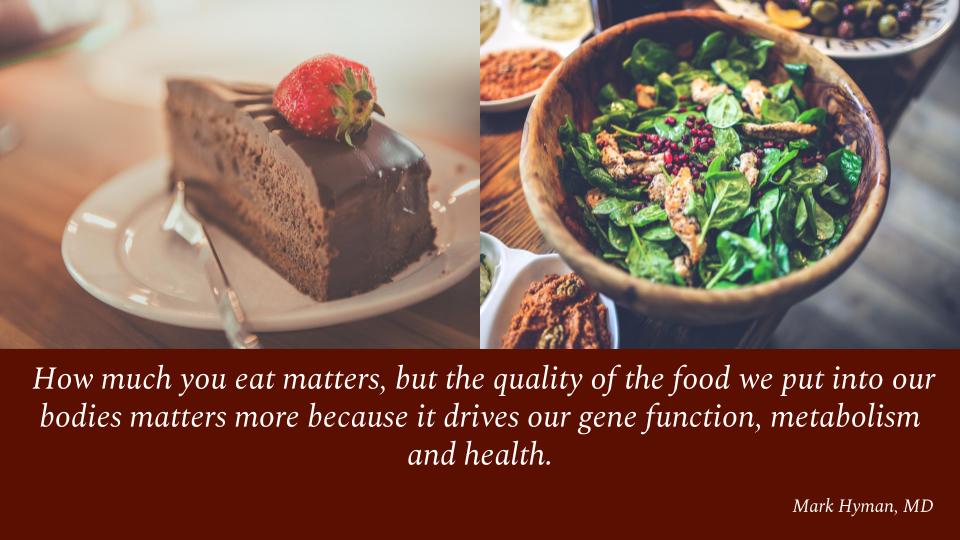|
A common perception (or rather misperception) is that weight loss requires a calorie deficit. Simply put, you must burn more calories than you consume in order to lose weight. And while there is some truth to this statement, it doesn't quite capture the true nature of the relationship that exists between what we eat, the total number of calories we eat, and how much we weigh.
For example, it's pretty obvious to most people that 10 calories of double-chocolate chocolate cake is not nutritionally equivalent to 10 calories of a dark, leafy green like spinach. Clearly, there's more to a food than simply the number of calories it provides or the grams of protein, carbs, and fat contained in each bite. Food is a vehicle for many other nutrients like fiber, vitamins, minerals, and phytonutrients, all of which may ultimately impact not just our health but also our weight, even beyond the number of calories a particular food contains. There's a growing consensus in the health and wellness community that the number of calories we eat isn't nearly as important as the quality of those calories. And while calories do matter, they don't matter nearly as much as once believed. This is because our bodies aren't simply furnaces that burn fuel. They are a complex system of complementary systems that are capable of deriving more or less energy from a food depending on our physiological need, the type of food, the overall makeup of the food and the nutrients it contains, our metabolic health, as well as the impact of our gut microflora, which appear to play a key role in the digestion of the foods we eat as well as eating the foods themselves. Case in point. In the past, well-meaning health experts have cautioned against eating too many nuts, which happen to be high in healthy fats and other macro, micro, and phytonutrients but also high in calories. Adhering to the "too many calories in model," the belief was that while nuts may be good for us thanks to all their nutrition, they also contribute a lot of fat and ultimately calories to a diet, and thus have the potential to make us fat. As a result we were told not to eat too many nuts. Epidemiological studies suggest otherwise. Not only do diets that include nuts not lead to weight gain as one would assume based on the "too many calories in model," the regular consumption of nuts actually seems to be protective against weight gain. Several theories have emerged to explain these unexpected observations. For one, nuts contain lots of fiber and other lipid-storing granules that are not completely digested. Nuts, thanks to their high fat content, also tend to be incredibly satiating and may lead to less overeating. Finally, thanks to their high protein content, high fiber content, and high polyunsaturated to saturated fat ratio, nuts simply take more energy to digest. In a nutshell, it takes energy to digest nuts, thus lowering the net energy (calories) gain we get from eating them. Likewise, there is some evidence that the number and types of bacteria populating our guts can impact how many calories we are able to extract and absorb from the foods we eat. It is also believed that the types of bacteria that populate and thrive in our gut are highly dependent upon the quality of our diets, aka they types of food we eat. For example, plant-based, whole-food diets are associated with a healthier gut microbiome than diets high in sugar, animal protein, and ultra-processed foods. Another possible factor might relate to the glycemic load of the foods we are eating. For example, foods with a high glycemic load (sugar, starches and processed grains) tend to cause large spikes in blood sugar which then cause insulin to be released from the pancreas. Insulin's job is to remove this excess blood sugar from circulation and then transport and deliver it into cells where it can be used as energy or stored as fat for to meet a future need. There is some evidence that large, repeated spikes in blood sugar and the subsequent release of insulin favors the storage of fat and thus may contribute to excessive weight gain as the years pass. Furthermore, repeatedly exposing the cells to high levels of insulin may also desensitize the cell membrane over time and possibly contribute to the development of Type II diabetes. Take home point: While calories do matter, they aren't the only thing to consider when making food choices. They're also probably not even the most important thing. When it comes to our health and our waistlines, quality is key. Choose plant-based foods that are as close to their natural form as possible rather than foods that are made in a plant and come in a box or a bag. The fewer ingredients, the better. Think fruits, vegetables, nuts, seeds, legumes, beans, whole (unrefined) grains and grain products like quinoa, whole grain brown rice, and whole oats. Quality meat and dairy can also be eaten in moderation. Don't worry so much about counting calories, or grams of macronutrients (protein, fat, and carbs), but aim for eating a colorful plant-based diet. Doing so will promote better health and trimmer bodies. It will also allow you to eat more, while achieving and maintaining an ideal weight. .
0 Comments
Your comment will be posted after it is approved.
Leave a Reply. |
AuthorShaun Taylor Bevins Archives
April 2020
Categories
|

 RSS Feed
RSS Feed